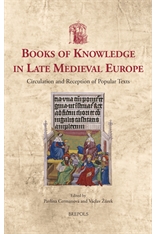Books of Knowledge in Late Medieval Europe: Circulation and Reception of Popular Texts, ed. Pavlína Cermanová and Václav Žůrek (Turnhout, 2021: USML 52), xiv+376 pp. ISBN 978-2-503-59463-7.
This volume presents a new, complex approach to reading and reading techniques of books mediating knowledge in late medieval Europe
This book provides a series of studies concerning unique medieval texts that can be defined as ‘books of knowledge’, such as medieval chronicles, bestiaries, or catechetic handbooks. Thus far, scholarship of intellectual history has focused on concepts of knowledge to describe a specific community, or to delimit intellectuals in society. However, the specific textual tool for the transmission of knowledge has been missing. Besides oral tradition, books and other written texts were the only sources of knowledge, and they were thus invaluable in efforts to receive or transfer knowledge. That is one reason why texts that proclaim to introduce a specific field of expertise or promise to present a summary of wisdom were so popular. These texts discussed cosmology, theology, philosophy, the natural sciences, history, and other fields. They often did so in an accessible way to maintain the potential to also attract a non-specialised public. The basic form was usually a narrative, chronologically or thematically structured, and clearly ordered to appeal to readers. Books of this kind could be disseminated in dozens or even hundreds of copies, and were often available (by translation or adaptation) in various languages, including the vernacular.
In exploring these widely-disseminated and highly popular texts that offered a precise segment of knowledge that could be accessed by readers outside the intellectual and social elite, this volume intends to introduce books of knowledge as a new category within the study of medieval literacy.
Contents:
Pavlína Cermanová and Václav Žůrek, “Books of Knowledge – Late Medieval Central Europe and Beyond”
Steven J. Williams, “The Pseudo-Aristotelian Secret of Secrets: Encyclopedia or Book of Knowledge?”
Julia Burkhardt, “A Handbook for Everyone? Thomas of Cantimpré’s Book of Bees and Its Circulation in Late Medieval Europe”
Václav Žůrek, “Chess, Moral Principles, and Ancient Stories: The Success of Jacobus de Cessolis’s Liber de moribus and Other Classicising Works in Medieval Bohemia”
Pavel Blažek and Barbora Řezníčková, “The Pseudo-Bernardine Epistola de cura rei familiaris and its Reception in Medieval Bohemia and Moravia”
Gleb Schmidt, “From Manual to Best-Seller: The History of Honorius Augustodunensis’s Elucidarium”
Jaroslav Svátek, “From Theology to Universal Knowledge: The Story of the Elucidarium and its Vernacular Adaptations in the Czech Lands (Fourteenth-Fifteenth Centuries)
Lucie Doležalová, “A ‘Book of Knowledge’? The De tribus punctis christianae religionis (1316) by Thomas Hibernicus and its Heyday in Late MedievalBohemia”
Nadine Holzmeier, “Patterns of Knowledge in Late Medieval Historiography: The Chronologia Magna of Paolino Veneto”
Vojtěch Bažant, “Reading the Early Church: A Witness from Kutná Horá of the Chronicon pontificum et imperatorum by Martin of Opava”
Baudouin van den Abeele, “The Physiologus Theobaldi: A Most Successful Bestiary in Medieval Schools and Monasteries”
Dana Stehlíková, “Christian of Prachatice’s Latin Herbarium and its Adaptations in Old Czech Literature”
Lukáš Lička, “The Aims of Perspectiva in 1360s Paris: Investigating Texts Written in the Hand of Reimbotus de Castro”
Pavlína Cermanová, “Sharing Academic Knowledge: Commentaries on the Secretum secretorum”


